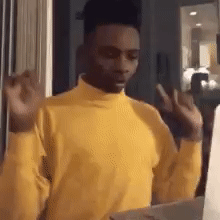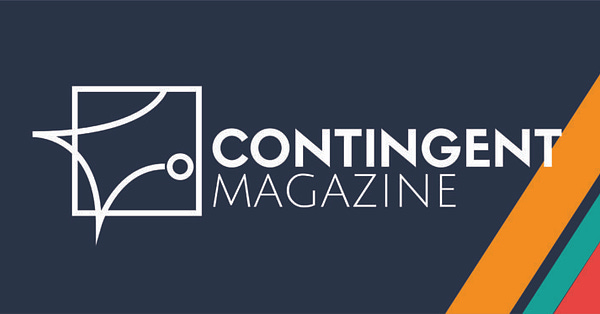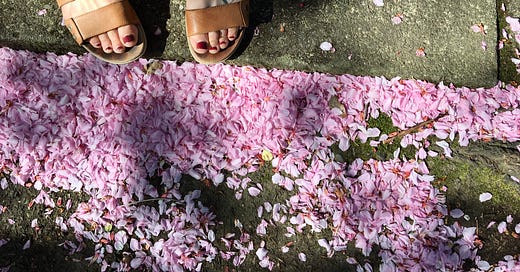Thoughts on picking up broken glass
plus an interview with Sierra Magazine Adventure Editor Katie O'Reilly

“I wanted to trace the lost patterns that came before the world was broken and find the new ones we could make out of the shards.” — Rebecca Solnit
I live just off a busy stretch of shops and restaurants and bars in Northwest Portland. Before the pandemic, the sidewalks were always full of people coming and going and bustling about. Now it’s quiet. The glass doors of small businesses have sad little signs about how much they’ll miss their customers and their communities with promises to be back soon; “we tried our best to stay open,” says one. The dates they mention have mostly passed.
There’s a wedding dress boutique on this strip where the same three dresses have stood guard in the window for weeks. They used to change out the dresses every few days, and I always enjoyed seeing what new styles beckoned soon-to-be brides into this cocoon of silk and tulle. Yesterday I walked by on my way to the dog park with Jackson, and I noticed a woman sitting at a white desk in the middle of the shop, staring at a computer, surrounded by white walls and white carpet and all those white dresses. Her elbows were on her desk and her head was in her hands. A chocolate lab, looking regal but a little unsure, was curled up on the carpet in front of her.
I wondered what she was looking at on the screen. A squiggly line plummeting toward the bottom right corner? An email from the landlord? She looked tired—and when she looked up I couldn’t help but look away, as if I’d seen something I shouldn’t.
Every day lately, moments like this one remind me of how much hardship is happening out there. These are little pieces of broken glass, scattered all over the city, all over the country, or wherever you are, too.
I try to always write these moments down, picking them up gently, slowly, careful not to cut myself on the sharp edges.
The blue tape that reads “temporarily closed” stretched around an empty playground where pink petals fall on the slide.
A sign with a child’s handwriting that says, “We are strong! We will get through this!” in the entrance of my building.
The line of people waiting for boxes of food, handed out by volunteers in masks and gloves, every Tuesday and Thursday at the church down the street.
An inside-out latex glove, discarded on the curb.
I pick up pieces of stories lately the same way I pick up the pieces of a wine glass when it breaks in the sink. (Which yes, happens semi-regularly.) Slowly. Deliberately. Mindful of the edges.
This morning I had a collection of Google Alerts about the Jordan Cove pipeline proposal in my inbox, an issue I’ve been following for some time. There are new developments as locals push back against a project that would compromise their health, their land, and the environment. Also, it’s the 50th Anniversary of Earth Day and people are talking about how you can suddenly see the mountains from the cities but also the EPA has stopped enforcing environmental regulations and methane is leaking at a higher rate than ever and the goddamn fossil fuel industry is going to be bailed out while book stores and bakeries and little wedding dress boutiques struggle to survive.
So many stories to cover.
So many pieces of broken glass.
(I archived all of those alerts for now to write this newsletter.)
The point is, you can’t grab it all at once. You’ll be left with cuts and a bloody trail. You have to be careful. You can be thorough, but you have to protect yourself.
As writers, I believe it’s important to pick up these pieces of broken glass, examine them carefully, and place them in new patterns. Or just keep them somewhere safe, for later. We can’t gather it all. We can’t understand it all. Sometimes it is our job to capture the moment. Sometimes we just do it because we’re writers and words are what help us make sense of the world. But we also have to keep ourselves safe and sane.
Maybe the sun will catch your collection of broken glass just right and you’ll make something beautiful out of this mess.
Recommendations of the Week
Earth Day is all online this year, with 72 hours of live-streamed presentations, performances, actions, and more. With scientists warning that 2020 is the year we must make big changes to avoid the most catastrophic impacts of the climate crisis, this Earth Day is a critical moment to rally the globe. Get in there, take part, and I bet you’ll find a treasure trove of stories.
My friend Dani produces a beautiful podcast called Mudlark where she digs into emotional topics that are sometimes hard to talk about. She recently interviewed writing coach Madeleine Eno on the art of storytelling. Eno offers some lovely insight on finding creative inspiration in heartbreak, and the value of being a little broken.
I loved this essay about living in a tiny room in New York City from Trey Taylor on Curbed.
Editors Who Want Your Pitches










Katie O’Reilly, Adventure Editor at Sierra Magazine, on Environmental Journalism + Earth Day’s 50th Anniversary
“Don't be shy about pitching stories in this space—if you're not a climate scientist, remember that you're also not being paid like a climate scientist, and that the changing climate and a number of other eco hot buttons affect all areas of our lives.”

I’ve been a fan of Katie’s writing for some time, so it was a delightful surprise to find myself on a press trip with her in Arizona (back when we traveled for such things… sigh) where we had the opportunity to discover a mutual appreciation for the book Spinster by Kate Bolick and also Chicago dive bars. Katie is an editor at Sierra, the magazine attached to the United States’ oldest environmental group. She also writes beautiful personal essays that blend cultural criticism with honest experiences and reflection. (She shares one below.)
I caught up with Katie about what work has been like at an iconic environmental publication, in the midst of two global crises.
Do you remember the first article you wrote about the environment and/or climate change? How did you decide this was the beat you wanted to focus on?
Honestly, I fell into it a bit accidentally; I'd never even taken any classes in environmental or ecological studies. I was working as a general assignment reporter for an NPR-affiliate radio station in a small town in North Carolina in 2013/14, mainly covering city council meetings, local elections, and colorful little protests. But occasionally I'd get to write stories about coal ash spills, sea turtle migration season, and waste management (landfill diversion is more fascinating than you'd think!). And I just loved how challenging and complex those stories could be—how they typically blended human interest, science, politics, and culture. And of course they felt so urgent.
What does this Earth Day mean to you and the work you do?
This Earth Day is unlike any other, if for no other reason than that the earth feels so out of reach and that most will mark today's 50th anniversary in pixels, not parks—in the confines of our individual homes rather than the public open of a shared world. While I'm excited for three days of virtual Earth Day Live events, I hope that this big Earth Day anniversary—and the still-accelerating climate crisis—doesn't fall by the wayside, due to the other, much more visible global crisis. In Before Times, my colleagues and I worked hard to put together a special Earth Day package, in which we asked several activists and writers, young and old, to write essays about what Earth Day means to them, and their formative experiences with the holiday. Working on it made for a meaningful way to commemorate Earth Day's 50th. I learned a ton about its origins and legacy, and the experience made me think more critically about Earth Day's future potential.
Other than working from home, how has your job at Sierra changed since social distancing and other impacts of COVID-19 entered our lives?
I already worked from home a few days a week, and I love writing and editing from my bed or backyard as much as anyone, but I dearly miss all the casual little interactions in the office, before or after editorial meetings, that would spark story ideas and editing breakthroughs. As a magazine staff we've had to devise some crafty virtual replacements for sharing and marking up proofs, and find ways to spark flow during digital editorial meetings/brainstorming sessions (Zoom pet cameos truly help!).
There is so much science to learn and make sense of for readers when it comes to environmental journalism. Any advice for writers who want to cover environmental topics but worry they're lacking in expertise?
It's such a complex topic that I think just about any writer can come at it from an area of expertise. Do you typically write about food and travel? There's a ton to explore in the food waste solutions, eating low on the food chain, zero-waste dining, human-powered outdoor adventure, plant-based restaurant-going, etc. Like writing about art? There's all manner of cool things visual artists and musicians are doing in this space, and I love think pieces that examine, say, the efficacy of activist art, or the concept of food sovereignty. Interested in technology and social media? Tell stories about the digital innovations that are supposed to help businesses and individuals become lean, green machines. And don't be shy about pitching stories in this space—if you're not a climate scientist, remember that you're also not being paid like a climate scientist, and that the changing climate and a number of other eco hot buttons affect all areas of our lives. (And good stories are how we hope to get people to latch onto the mission and better engage!)
How do you avoid burnout when writing and editing stories about climate change? Where do you find hope?
Oh man, I can't say I've mastered that! It's something I struggle with, for sure, but the good news is, there are a ton of big exciting ideas in this space, lots of cute animals, plenty of natural awe, and fascinating visionaries and innovators. So it's not often that a story I'm working on feels purely depressing—there's usually hope and quirk to latch onto! (And I love finding good solution-oriented stories; that's always the most exciting.)
What is one article that you found especially enjoyable or satisfying to work on recently?
Last fall, I tackled a topic my millennial peers and I had been talking about for some time—the question of the morals and logistics of reproducing during the Age of Climate Change. Writing that essay about my own personal reckoning with the topic was vulnerable and hard, but led me to read great stuff and meet fascinating people, and rendered so many personal decisions and thought processes more meaningful.
Any tips for writers who want to be sensitive about the impact the pandemic is having on the world, but also still want to pitch stories about the environment/climate change/climate justice/etc.?
As an editorial staff, we're honestly still striving to strike the right balance between tone-deaf and welcome distraction, and finding ways to cover the pandemic that don't seem crass, so... no easy answers here! But think about how the pandemic is affecting your life, the questions it's raising. I've edited some great stories about social distancing in the Great Outdoors, pandemic gardening tips, backyard birding, and (thanks to our lovely newsletter creator), the carbon footprint of all our Netflix bingeing. I doubt many editors are quite sure what kinds of pandemic content they want right now, but I'd say, pitch the stories you'd like to read about it!
One more question for you…
What is something in your life that you’ve considered writing about but haven’t? Why?
(If you ever want to share these answers confidentially with me, you can always hit reply on this email!)
That’s all for now, friends. I’ll be introducing some exciting new additions to One More Question soon, and a way to support the work that goes into this if you so choose. So stay tuned for that.
And please, if you enjoyed this, it would mean so much to me if you shared this with a writer friend or recommended it on social media. 💛



